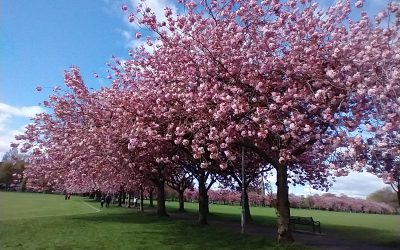The other night I went to hear a great Irish folk band, Lankum, at the Traverse theatre bar. I first came across them in a BBC Alba television programme when they were called ‘Lynched’, a name they have understandably ditched. Their talent stuck in my head, so when I saw they were performing in Edinburgh I went along.
The performance was sold out and a large cheerful crowd of all ages, shapes and sizes was jostling for space around the bar tables. Whenever I find myself in crowds like this I always long to sweep them up and take them along to listen to my next concert, for it is so pleasant to be among such an audience.
To my ear, folk music tends to be repetitive from the musical point of view, but there are other fascinations. The words usually deal with hardship in some form or another – political, romantic, financial. ‘What will we do if we have no money? Oh true lovers, what will we do then?’, sang Radie Peat with a raw and lonely sadness that hushed the audience.
It struck me that the presence of words makes the message so clear. In the instrumental music I usually play, there is just as much emotion and searching for consolation, but it is not labelled. You have to be prepared to go looking for what’s in it, because nobody tells you beforehand that it’s about the rage of the prisoner or the sorrow of the abandoned lover. If you are the instrumentalist, you constantly have to ask yourself how to get the unspoken message across.
Not for the first time, I thought how helpful it would be if composers had given evocative titles to their pieces, or put words to their most important melodies. I know why they didn’t, but when I go to folk song performances I rather wish they had.




Hello Susan, I think you are right that words do much to label or steer the meaning of a piece of music, and this, coupled with the simple harmony and repetitions of folk music explains why such music easily finds an audience. But I find myself more and more interested in the way music can convey meanings which cannot be labelled or transmuted into recognizable situations. (I think of music as meaning without a referent). Incidentally, this morning I taught a class on Messiaen’s Quartet for the End of Time. One of the thoughts I posited was how would we react to Messiaen’s assymmetrical and often dissonant music if his titles and epigraphs were not telling us to interpret at least some of this music as expressing a vision of divine order?
Rikki, these are great questions about Messiaen and I would love to know what answers your students come up with!
What Will We Do When We’ll Have No Money? Was a haunting song that will stay in my mind. The singer voice was a unique blend of folk with a twang.The unanswered question was one that most people struggle with and the musicians put all together beautifully.
I agree with you, Rae – it was haunting.